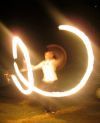#1A Little Night Music- Protagonist?
Posted: 4/15/12 at 2:45am
Hello, all!
I'm analyzing the script of ALNM for a class and was up in the air about who the protagonist is; in writing my explanation of the question, I actually ended up articulating what I think is a solid answer, but want to enlist your opinions to see if a case could be made for another character. (I was torn between Fredrik and Desiree).
Thanks!
#2A Little Night Music- Protagonist?
Posted: 4/15/12 at 4:29amI think the stage show has dual protagonists. The original Bergman film seems to be slightly more from Fredrik's perspective on the whole, but that really has to do with screen time.
blocked: logan2, Diamonds3, Hamilton22
#2A Little Night Music- Protagonist?
Posted: 4/15/12 at 5:19amI think it has to be Frederick, as well. He's the one faced with changing, and he's the connectivie tissue for the other characters.
#3A Little Night Music- Protagonist?
Posted: 4/15/12 at 8:18amFredrika is totes the protagonist. JK.
#5A Little Night Music- Protagonist?
Posted: 4/15/12 at 9:47am
Frid.
No, but in all seriousness, I would probably say Frederik. The song in the slot where "Send in the Clowns" is now was originally going to be a piece for Frederik.
#6A Little Night Music- Protagonist?
Posted: 4/15/12 at 10:58am
You can analyze a script all you want, but the showstopper DID go to Desiree and for good reason. I've never seen a production where Desiree wasn't the most memorable character onstage, the one that shimmers and glows and lands all the good jokes, the one you're rooting for to come out a winner in the end. I can't even remember many of the Frederick's I've seen but the memories of Catherine Zeta Jones, Juliet Stevenson, Jean Simmons, Patrice Munzel, and the great Glynis Johns will always be there for me.
Despite what your brain claims, your heart doesn't lie about who's the protagonist of the show.
timote316
Broadway Legend Joined: 7/20/04
#7A Little Night Music- Protagonist?
Posted: 4/15/12 at 11:18amcharlesjguiteau-- "Protagonist" is a literary term, not another name for "main character" or "most memorable". The three can certainly all be the same, but aren't always. In A LITTLE NIGHT MUSIC, they are not.
#8A Little Night Music- Protagonist?
Posted: 4/15/12 at 11:45am
Fair enough. But I believe it's Desiree who takes most of the key actions in the play. It is she who winks at Frederick from the footlights, she who co-opts her mother into inviting the Egerman's to the Chateau for the weekend with the intent to free Frederick from his childbride, and she who makes the overt play for Frederick's affections in her bedroom. Frederick does take that fateful walk to her rented digs after the night at the theater, and he does choose to walk out of her bedroom after "Send in the Clowns", but otherwise, doesn't he generally just react to the actions of others?
I also believe that choosing the protagonist in a live stage musical works by different rules than choosing one in a book. Songs matter, stage time matters, audience impact matters, or should.
#9A Little Night Music- Protagonist?
Posted: 4/15/12 at 11:46am
I would say Desiree is the instigator for all of the main plots. She sets everything into play, trying to snag Fredrik after all these years. And she gets "most memorable" song, even in the scene where Fredrik realizes he's not going to leave his wife after all.
But I would say Fredrik is the protagonist. It's really told through his eyes for much of the story (not all).
Some of Tennessee Williams' plays are similar, where the protagonist is Brick (in Cat on a Hot Tin Roof), but the instigator is Maggie. The protagonist in Glass Menagerie is Tom, but the instigator is Amanda.
EDIT: Even in "Amadeus," the protagonist is Salieri, but the instigator is Mozart.
blocked: logan2, Diamonds3, Hamilton22
#10A Little Night Music- Protagonist?
Posted: 4/15/12 at 1:39pm
I think one has to come to a decision about what protagonist means, and there are varied interpretations, some allowing for dual protagonists in the meaning of lead characters, which, in multi-plot (not necessarily the genre of ALNM, although subplot is certainly quite active in it) may be numerous people in counterpoint. Others might allow for dual protagonists only when they are a team each working together in the same direction. Others might say that a protagonist is always in opposition to an antagonist, and in ALNM Desiree's and Frederic's interests, in their own minds, for most of the play, are in opposition. Desiree wants to reunite with Frederic. Frederic while seeing the advantages of reconciliation, resists it (in In Praise of Women, he muses that had he not found her so perfectly perfect when they met again, it would have been wonderful). Since this is a romantic comedy, and we want Desiree and Frederic to be together, and they are at the resolution, I would think Desiree is the successful protagonist.
Updated On: 4/15/12 at 01:39 PM
muchadoabout_me2
Chorus Member Joined: 4/13/08
#11A Little Night Music- Protagonist?
Posted: 4/15/12 at 4:38pmI directed a production of ALNM last year, and I treated Desiree as the protagonist. The question of whether she will be able to surrender a "life of muddle" for a more "coherent existence" is what drives the journey of the musical, from exposition (Glamorous Life) to rising action (Weekend in the Country) to climax (at least what seems to be a climax...Send in the Clowns) to a resolution fit for a romantic comedy. As far as who the antagonist would be, you have Fredrik, who chooses a life with Anne, but in terms of this "major dramatic question," also Desiree herself.
Gaveston2
Broadway Legend Joined: 6/28/11
#12A Little Night Music- Protagonist?
Posted: 4/15/12 at 5:28pm
"I would think Desiree is the successful protagonist...."
The problem is that Fredrik initiates the plot, which is normally held to be the protagonist's primary job. The word itself roughly translates to "he who begins the conflict".
henrik, I think you were on the right track when you spoke of "dual protagonists". (While proofreading, I noticed that best12bars suggested that first. Sorry, b12.) Romantic comedies often have them. The word itself loses meaning the further we get from linear tragedies. (Who's the protagonist of FOLLIES? I think you'd have to make a case for Dimitri Weisman.)
But take one step away from OEDIPUS (the clearest protagonist of all and hence the model taught endlessly in high school English classes) to ANTIGONE and you fall already into an endless argument over which of the agonists is "pro" (Antigone because she buries her brother or Creon because it is his law which left the brother unburied in the first place?). The bottom line is it doesn't matter--the entire play is Antigone and Creon at odds--and deciding one or the other is protagonist tells one nothing about how to stage the play.
Who is the "protagonist" of THE MUSIC MAN? Well, technically, it's Harold Hill, since he initiates the action by coming to swindle River City. But is Marian the antagonist? Maybe for a scene or two, but she has joined Hill's side by the end of Act I and the question for the rest of the evening is whether Mayor Shinn will break up the lead couple by arresting Harold. But even before Marian or Harold knows it, the text makes it clear that they are both stubborn romantics who very much belong together. Dual protagonists and, despite their spats, they work together or take turns moving the action forward more often than they are actually at odds.
Back to ALNM, Frederick initiates the action, but Desiree picks it up with the weekend invitation. (That the authors initially thought Frederick would sing there merely tells us they hadn't found their story yet.) They trade off more than once in Act II.
And who is the antagonist? Carl-Magnus, obviously, but also Anne, Henrik, Charlotte--practically everyone else in the play at some point or another EXCEPT maybe Frid.
As with THE MUSIC MAN and so many romantic comedies, you basically have dual protagonists struggling against many obstacles (including, at times, themselves) to end up together.
My apologies to myshikobit if this post doesn't help him fulfill an assignment. I can't help the nonsense they teach in English lit classes.
Updated On: 4/15/12 at 05:28 PM
#13A Little Night Music- Protagonist?
Posted: 4/15/12 at 5:55pm
Thanks, everyone, for your opinions- this has been a great discussion to read! So, the conclusion I've come to is that Fredrik is protagonist, insofar as he incites the basic action by taking Anne to Desiree's show in the first place (he knows that it will be a bawdy show, and he knows that Desiree will be devilishly sexual; isn't his hope that Anne could watch Desiree and become sexually inspired? Isn't he trying to fashion Anne into who Desiree was?) The MDQ seems to be "Will Fredrik consummate his marriage and 'renew his unrenewable youth'?" and ultimately he fails, as protagonists often do. The antagonists, I think, in descending order of significance would be Desiree, Anne, Henrik, Carl-Magnus, Charlotte and Fredrika.
Ask me questions about my conclusions, though! Challenge me!
Gaveston2
Broadway Legend Joined: 6/28/11
#14A Little Night Music- Protagonist?
Posted: 4/15/12 at 6:04pm
myshikobit, as the posts above demonstrate, strong cases can be made for either Frederik or Desiree or both, so I think that's fine.
But I would suggest to you that the MDQ (I'm assuming that means "main dramatic question") is "Will Fredrik come to his senses and stop acting like a damn fool?"
In other words, will he realize he has married the wrong woman?
While it's true that protagonists don't always get their wishes fulfilled, they usually do in comedies. But sometimes they don't really know their own desires or their intention is fulfilled in a manner they didn't anticipate.
Fredrik is a perfect example.
#15A Little Night Music- Protagonist?
Posted: 4/15/12 at 6:54pmWell, that's more the question that we, as the audience, should like to ask Fredrik, but the MDQ is based off of the protagonist's pursuit of his/her needs, wants and desires and is answered through the culmination of the play's action. Fredrik's is definitely answered in a manner he didn't anticipate. Thanks for the input!
#16A Little Night Music- Protagonist?
Posted: 4/16/12 at 11:24amMyshik, I think you made the right decision. Great thread and I am beginning to think the case for Frederic is stronger than the case I offered for Desiree.... using the single protagonist model.
Gothampc
Broadway Legend Joined: 5/20/03
#17A Little Night Music- Protagonist?
Posted: 4/16/12 at 11:37amYou're all wrong. A close examination of the story will reveal that the actual protagonist is Time.
Gaveston2
Broadway Legend Joined: 6/28/11
#18A Little Night Music- Protagonist?
Posted: 4/16/12 at 4:50pm
I believe the single protagonist model was popularized around the early 19th century when the Romantics were enjoying all those plays about tortured (young) men (FAUST, YOUNG WERTHER, DANTON'S DEATH and revivals of OEDIPUS and HAMLET). It suited the type of plays (and actors) that were popular then.
And the protagonist/antagonist dynamic specially suited Hegel's widely admired theory that a play was driven by a collision of thesis and antithesis. In order to ape Hegel, one had to name a protagonist to carry the play's thesis. So the "protagonist" and the quest for his identity were added to a formula invented so that students would have something to write in their notebooks.
myshikobit, could you give me a definition of the MDQ? It is not an Aristotelian, neo-Classical, Romantic or even Modernist concept and I've never encountered it before. Or if I have, it was called something else...
#19A Little Night Music- Protagonist?
Posted: 4/17/12 at 1:38am
The class's definition of MDQ stems from "Backwards and Forwards" by David Ball. I'm pretty sure the term is pre-existing, but our understanding of it as a class is supported directly by its contents. The text was published in 1983 and, from my understanding, is now one of the standard Script Analysis textbooks for most major universities (I know for a fact that Ithaca and my university's theatre department uses it, and I believe I've heard friends at NYU and CMU, which are the nation's current leading theatre schools, say that they've used it). It's crafted so that directors/dramaturgs/actors can understand plays in terms of action ("What happens that makes something else happens?") It's not a literary term. It's an "I'm staging a play" term.
Because, honestly, you could make claims such as "the actual protagonist is Time," but when I'm sitting down at the table for the first production meeting or read-through of the production of ALNM that I'm directing, that hypothesis isn't going to help me frame the play as much as "Oh, the play begins when Fredrik breaks the stasis by engaging in conflict Desiree and ends when he and Desiree reconcile their needs/wants/desires with each other" does. The text argues that conclusions like "Time is the protagonist" or "Hamlet's really in conflict with himself" make for uninteresting productions that don't give the play enough credit (because, for example, every action that Hamlet takes throughout the play is inspired by the conflict; the "to be, or not to be" isn't a sincere interior battle for his sanity, it's actually a ploy to fool Polonius and Claudius. And I saw a play with a similar plot to Hamlet's last month in which the lead actor chose to act a monologue as a bout of "inner torment" and, by God... he wasn't actually that bad, but it was so infuriatingly irrelevant. It was just really poorly directed; it's not a strong acting choice to begin with, but it also really didn't support the play.)
To the task at hand, though; The MDQ. The MDQ is ASKED by the inciting incident (the action that breaks stasis, such as "the Ghost of Hamlet Sr. tells Hamlet of his murder and need for revenge, and so Hamlet vows to take revenge on Claudius") and directly involves the protagonist and a strong, actable verb which leads to the ends of a need/want/or desire. The MDQ is ANSWERED by a direct action involving the protagonist and the antagonist that leads to a "Yes," "No," or (and most often) "Yes, But Not How They Thought".
For example: "Will Hamlet avenge his father's death?" and the answer is "Hamlet kills Claudius, thus avenging his father's death". In other words, "Will _____ do ______?" We just applied this to Beckett's "Footfalls" and I found it to be extremely and surprisingly illuminating. So, of course, I'm convinced at this point of its accuracy, but I whole-heartedly invite you to challenge my findings. Ask me lots and lots of questions, because whether in your direction or mine, that's how I grow.
Gaveston2
Broadway Legend Joined: 6/28/11
#20A Little Night Music- Protagonist?
Posted: 4/17/12 at 3:46pm
myshikobit, thank you. I haven't read Professor Ball's book, but I wholeheartedly applaud his emphasis on dramatic action rather literary devices. (I found a number of excerpts from the book at various websites. We didn't use him at the universities I attended, however, and MDQ is not a universally known term, like "inciting incident".)
But I'm sure Ball knows that the agent who interrupts the initial stasis of the play doesn't always provoke the action throughout the play. In ALNM, the action of the play is triggered by Fredrik's attempt to seduce Anne. But in doing so, Fredrik finds himself attracted to an old flame and seduces her instead.
For most of the rest of the play, the action is driven by that old flame's (i.e., Desiree's) efforts to win Fredrik back. Fredrik is hardly even active, except that (a) he accepts the invitation (really passive action) and (b) he fights the duel (pretty passive again). Other agents have picked up the action in the face of Fredrik's virtual paralysis.
Don't get me wrong: I agree that pinpointing the inciting incident is helpful. But it's also important to understand that a play doesn't have to have a solitary protagonist or "hero" just because OEDIPUS and HAMLET do. (Surely Ball covers this. He sounds sensible.)
I would still argue that, as I understand your explanation, the best MDQ for ALNM is "Will Fredrik (actually Fredrik, Desiree, Anne and Henrik) marry the right person?" While Fredrik and Anne may be legally married as the curtain rises, they aren't REALLY married; making a true marriage is the focus of the play.
To me, when a plot has numerous agents, then the most useful MDQ will be one which can be applied to more than a single protagonist.
#21A Little Night Music- Protagonist?
Posted: 4/17/12 at 4:27pm
"You're all wrong. A close examination of the story will reveal that the actual protagonist is Time."
Interesting and I think it would make a great paper (if not arguing for time as a protagonist, discussing time in all of its ramifications in the show). And very Bergmanesque.
Viewing time as a character (or at least a throughline force akin to a character - protagonist? antagonist? catalyst?) in the play gives added dimension to "Perpetual Anticipation, (the sun won't set)" "Now," "Soon," "Later," and perhaps every song in the score.
thelateorratherlater
h.e.
Updated On: 4/17/12 at 04:27 PM
#22A Little Night Music- Protagonist?
Posted: 4/17/12 at 4:42pm
First of all, love love LOVE this thread; great analysis of one of my favorite musicals!
I have to agree with Gaveston2 that Frederik is a predominantly static character. Accepting the invitation is a great example of this: Anne has Frederik accept the invitation because she is convinced by Charlotte that going, and thereby contrasting herself with Desiree, will cause Frederik to fall out of love with Desiree. In fact, Frederik tells Anne that they could "simply say no". Turns out that all of the events in the plot have consequences for Frederik, but he has very little influence on any of them.
Gaveston2
Broadway Legend Joined: 6/28/11
#23A Little Night Music- Protagonist?
Posted: 4/17/12 at 10:38pm
^^^^Not that there's anything wrong with that!
(Good point about the invite, PianoMann. Thanks.)
ETA I used to the banish the T-word ("theme") from my play-reading and writing classes because you can't act a theme and endless meditation on themes can make for the most boring theater. (Okay, COMPANY and FOLLIES excepted.)
But I certainly agree that "time" is a very important theme in ALNM and, ultimately, an important unifying element in the play. Typical Sondheim: "I think I'll write an entire musical in variations of 3/4 time AND every lyric will deal with the theme of time."
Updated On: 4/17/12 at 10:38 PM
#24A Little Night Music- Protagonist?
Posted: 4/17/12 at 11:55pm
Gaveston- I highly recommend it. It's very succinct, so it's an easy first read with endless repeat value.
As for the show- I think what Ball understands is not that there can be two protagonists (don't think there truly is, but that's just my opinion), but each antagonist is, too, a protagonist... in their own story. What's important is that they have their own needs/wants/desires which just happen to be in direct opposition to the protagonist. Which makes this play really interesting at the end of act 1 is that YES, there are five different, very bold antagonists, all who inadvertently want the protagonist diverted from his NWD. And there can be five antagonists. But there's only one protagonist.
But that's not this story. This is a story about Fredrik and his coming-of-age, and it starts when he finally steps out of his shell and takes an action bold enough to trigger other actions which force him to realize that he needs to put his sophomoric lust away and take care of someone who can take care of him in return; who forces himself to take care of himself. Yes, Fredrik is WILDLY passive and that should really make us INFURIATED with him as an audience. That way, in the end, when the action in his life overwhelms him to the point where he is finally FORCED to accept his responsibility to grow up and do the right thing (the right thing as the audience sees it, and however arbitrary and minute as his acceptance is), the audience can be so happy for him! Because he's a likable guy; he's winsome, he's witty, he should be an attractive man (if he's married to Anne- sex or no sex). Maybe it's so satisfying to see him grow up after shouting "GROW UP" at him all night; after we've been listening to the ticking clock which is Sondheim's score all night and still haven't seen him move at all, to have him finally overcome the summer night's second smile.
But has a director ever fully embraced this? I remember hearing about Eric Schaeffer's production of Passion in which he really embraced Giorgio as the true protagonist despite the allure of Fosca's pyrotechnic, "unconventional protagonist" glow; and how the piece triumphed as it never had before. Well, maybe that's what we need here. Just maybe. I don't think there's been a satisfying major revival of ALNM since the original, to be honest; I saw the 2009 with Zeta-Jones in person and the Sally Ann Howes online and was never as satisfied as I was listening to Len Cariou on the OBC.
I worship Len Cariou, so this may seem a bit biased, but maybe his Shakespeare-trained brilliance inadvertently centered Fredrik as the true protagonist of its production without it explicitly being indicated by the direction. Maybe he just commanded the stage enough for the production to be true to the play's structure. With all due respect, I doubt Hal Prince was honestly thinking about "Who is the protagonist" while crafting the show and it's possible that Len could've just fallen into the perfect place... maybe the OBC was an anomaly in that it thrived in SPITE of uninspired script analysis. I've no right to fully judge, but that's my hypothesis and I weep to think of what a deeply moving production may yet be created by actually going back to the book and trying to really center this play around the protagonist. Hopefully, while still very doubtful of it happening, I'll be a proponent of this proposed production.










